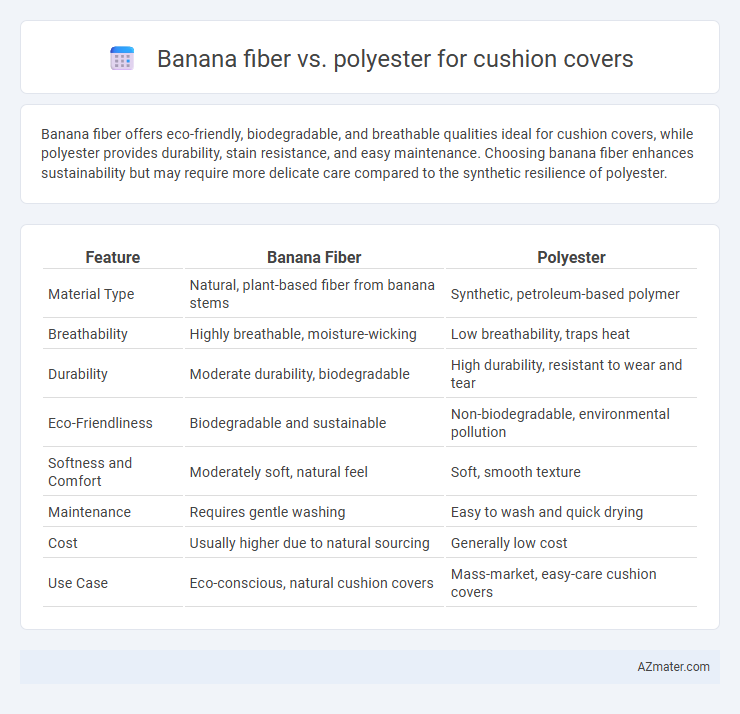Banana fiber offers eco-friendly, biodegradable, and breathable qualities ideal for cushion covers, while polyester provides durability, stain resistance, and easy maintenance. Choosing banana fiber enhances sustainability but may require more delicate care compared to the synthetic resilience of polyester.
Table of Comparison
| Feature | Banana Fiber | Polyester |
|---|---|---|
| Material Type | Natural, plant-based fiber from banana stems | Synthetic, petroleum-based polymer |
| Breathability | Highly breathable, moisture-wicking | Low breathability, traps heat |
| Durability | Moderate durability, biodegradable | High durability, resistant to wear and tear |
| Eco-Friendliness | Biodegradable and sustainable | Non-biodegradable, environmental pollution |
| Softness and Comfort | Moderately soft, natural feel | Soft, smooth texture |
| Maintenance | Requires gentle washing | Easy to wash and quick drying |
| Cost | Usually higher due to natural sourcing | Generally low cost |
| Use Case | Eco-conscious, natural cushion covers | Mass-market, easy-care cushion covers |
Introduction to Banana Fiber and Polyester in Cushion Covers
Banana fiber, a natural, biodegradable material derived from banana plant stalks, offers eco-friendly durability and breathability for cushion covers, enhancing comfort and sustainability. Polyester, a synthetic polymer widely used in cushion covers, provides high strength, wrinkle resistance, and easy maintenance but lacks biodegradability. Choosing between banana fiber and polyester involves balancing sustainable appeal with performance characteristics such as moisture resistance and longevity.
Material Origins: Natural vs Synthetic Fibers
Banana fiber is a natural, biodegradable material derived from the pseudostem of banana plants, offering eco-friendly and sustainable qualities ideal for cushion covers. Polyester, a synthetic fiber produced from petroleum-based polymers, provides durability and resistance to wrinkles and stains but lacks biodegradability. Choosing banana fiber supports renewable agriculture and reduces environmental impact, whereas polyester relies on fossil fuels and contributes to microplastic pollution.
Environmental Impact: Sustainability and Biodegradability
Banana fiber outperforms polyester in environmental impact due to its renewable nature and complete biodegradability, decomposing naturally without releasing harmful microplastics. Polyester, derived from petrochemicals, contributes significantly to carbon emissions and persists in landfills for hundreds of years, causing long-term pollution. Choosing banana fiber for cushion covers supports sustainability by reducing reliance on fossil fuels and promoting eco-friendly waste management.
Durability and Strength Comparison
Banana fiber offers natural durability and tensile strength, making it resistant to wear and tear compared to polyester, which is a synthetic fiber known for strong abrasion resistance and high tensile strength. While banana fiber cushions provide eco-friendly robustness with moderate elasticity, polyester covers excel in long-lasting resilience and wrinkle resistance under frequent use and washing. The choice depends on preference for sustainable, breathable fabric versus highly durable, chemically-treated textile ideal for heavy-duty applications.
Comfort and Aesthetic Appeal
Banana fiber cushion covers offer exceptional breathability and natural softness, enhancing comfort by regulating temperature and moisture better than polyester. The organic texture of banana fiber creates a unique, rustic aesthetic that adds an eco-friendly, handcrafted appeal, contrasting with polyester's smooth but synthetic appearance. Polyester cushion covers excel in durability and color retention but often lack the natural warmth and tactile richness provided by banana fiber.
Maintenance and Care Requirements
Banana fiber cushion covers require gentle hand washing with mild detergent and air drying to maintain their natural texture and prevent fiber damage. Polyester cushion covers are highly durable, machine washable, and resist wrinkles and shrinking, making them low maintenance. The natural biodegradability of banana fiber contrasts with polyester's synthetic composition, which demands less frequent washing but poses environmental disposal challenges.
Cost Analysis: Affordability and Value
Banana fiber cushion covers typically offer eco-friendly benefits at a moderate cost, making them a sustainable yet slightly pricier option compared to polyester. Polyester cushion covers are generally more affordable due to mass production and synthetic materials, providing high durability and stain resistance at a lower price point. Considering long-term value, banana fiber's biodegradability and unique texture may justify the initial investment for environmentally conscious consumers seeking natural alternatives.
Allergenicity and Health Considerations
Banana fiber is a natural, hypoallergenic material that reduces the risk of skin irritation and respiratory issues, making it ideal for allergy-sensitive individuals. Polyester, a synthetic fabric, can trap dust mites and allergens, potentially worsening allergic reactions and causing skin irritation. Choosing banana fiber cushion covers promotes better indoor air quality and minimizes health risks linked to synthetic fibers.
Market Availability and Trend Analysis
Banana fiber cushion covers are gaining traction in eco-conscious markets due to their sustainability, biodegradability, and natural texture, appealing to consumers seeking organic home decor alternatives. Polyester remains dominant in the cushion cover market because of its affordability, durability, and widespread availability in various colors and finishes, driving mass production and retail presence. Market trends indicate a growing niche demand for banana fiber products, supported by increasing awareness of environmental impact, while polyester maintains stronghold driven by cost-efficiency and versatility.
Conclusion: Choosing the Best Fiber for Cushion Covers
Banana fiber offers a sustainable and biodegradable alternative to polyester, boasting natural breathability and moisture-wicking properties ideal for cushion covers in eco-conscious homes. Polyester provides superior durability, stain resistance, and a wide variety of textures and colors, making it suitable for high-traffic areas or commercial use. Selecting the best fiber for cushion covers depends on balancing environmental impact with practical performance, where banana fiber suits sustainable decor and polyester excels in long-lasting, low-maintenance applications.

Infographic: Banana fiber vs Polyester for Cushion cover
 azmater.com
azmater.com